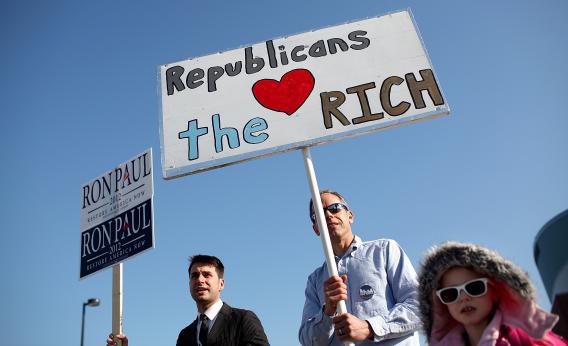Right before the polls closed in New Hampshire, I made one last stop, in a downtown Manchester precinct, a place I was expecting to teem with working-class voters. Outside the Ward 5 polling station: eight Ron Paul volunteers holding all-but-trademarked R3VOLUTION signs. That didn’t surprise me. The huzzahs from voters did.
“Is this where I go to vote for Ron Paul?” asked a woman hurrying from her car. A construction worker named Carl (no last name, please) traded places with her, his mullet wagging as he walked. He’d just voted for Paul. Right after 7, precinct leaders invited Paul’s people and reporters to watch the votes come in. There were 675 votes cast in Ward 5 the GOP primary. Paul won 233 of them, beating Mitt Romney decisively.
What did it mean? Well, on the drive to Manchester, I’d heard radio talker Howie Carr lay into a shocked, humbled Newt Gingrich over the pro-Newt super PAC that was attacking Mitt Romney’s business record. “You sound more like somebody from Occupy Wall Street,” sneered Carr. “I also sound like somebody from the Tea Party movement,” said Gingrich. And later, at Paul’s victory party, you could make out the noise of TV pundits explaining that Romney had out-smarted the Tea Party, and that he would do it again in South Carolina. One data point floated out of the muck: Romney was cleaning up with voters who made more than $100,000 per year. Only left-wing commentators focused on that.
Romney’s New Hampshire win was predicted by polls ever since he got into the race. The bigger developments from Tuesday were Paul’s continued strong showings and the new, confusing attacks on Bain. Both of them will test what a Republican Party newly swelled with disaffected, white, working-class voters will put up with in a nominee.
It’s a new problem. In 2008, when Mitt Romney lost the nomination to John McCain, poorer voters went for the winner. In New Hampshire, the 25 percent of New Hampshire primary voters who made less than $50,000 went for McCain over Romney by 13 points, much better than McCain’s overall margin of 5 points. This year, 26 percent of New Hampshire voters fit in the “less than $50,000” bracket. They split evenly, 31-31, between Romney and Ron Paul, while Romney was winning the election by 16 points. Among the one in nine voters who made less than $30,000, Paul actually defeated Romney, 35-31.
In New Hampshire, Paul was able to align the angry blue-collar voters who went for Pat Buchanan in the 1990s with liberals who wanted to cast anti-war (that includes the war in Afghanistan and the war on drugs) votes. The late libertarian economist Murray Rothbard, an old Paul ally, had dreamed about this for decades. But Paul can’t win the entire working-class electorate, and this vote won’t decide the GOP’s nominee, anyway. In 2008, the under-$50,000 vote in South Carolina was only a little larger than it was in New Hampshire: 28 percent. But the two biggest vote-getters in the first southern primary, John McCain and Mike Huckabee, won most of the working-class vote. Mitt Romney, who only got 15 percent overall, pulled 11 percent of the under-$50,000ers.
And that’s the context for Winning the Future PAC’s anti-Bain campaign, given some on-again off-again amplification by Gingrich. Most conservative talkers are united in attacking Gingrich—criticizing Bain Capital as a “vulture fund” is anti-capitalism! The Washington Post and Huffington Post quickly located “a Republican donor” and “a Republican source,” both “close to” Gingrich donor Sheldon Adelson, pronouncing the Bain attacks embarrassing and un-Republican. Americans for Prosperity, the best-funded of the Tea Party groups thanks to wealthy donors like David Koch and Art Pope, condemned Gingrich’s “anti-free market, class envy politics.”
But we need some proof that actual Republican voters are blanching at this more than they’d blanch at Bain Capital’s investment moves. So far, we don’t have that proof. On Jan. 10, as he was winning the Granite State, South Carolina polling had Romney ahead Gingrich, his nearest rival, 29.3 percent to 20 percent. On Friday, Romney’s lead had slipped, 26.7 percent to 22 percent over Gingrich. The damage came from Public Policy Polling and Rasmussen Reports, two robo-pollsters that found Gingrich bouncing since his Iowa nadir.
If there is some anti-“vulture capitalism” boomlet, Gingrich may not get to ride it. Sure, Romney made some of his money by taking over failing businesses, leveraging them, and extracting cash. Gingrich made his post-speakership money as a “historian.” For some reason, Gingrich has talked down the money he made from consulting by bragging about the $60,000 he could make for speeches. Give Republicans a primary between Hank Rearden and Wesley Mouch, and you know whom the punditocracy and talk radio is going to endorse.
Romney’s lucky: The three candidates vying for working-class Republican voters—Gingrich, Paul, and Santorum—seem like they’ll divide it up rather than ride it to primary victories. Santorum has worked the hardest to win over blue-collar votes. When he’s attacked for earmarks, he defends them. When Gingrich makes fun of “Occupy” protesters, Santorum warns that economic inequality is real. Santorum might be better-positioned than anyone else to take advantage of Romney’s working class weakness. But in the end, Romney’s better-positioned to watch the three of them fight for that vote, then lose.
